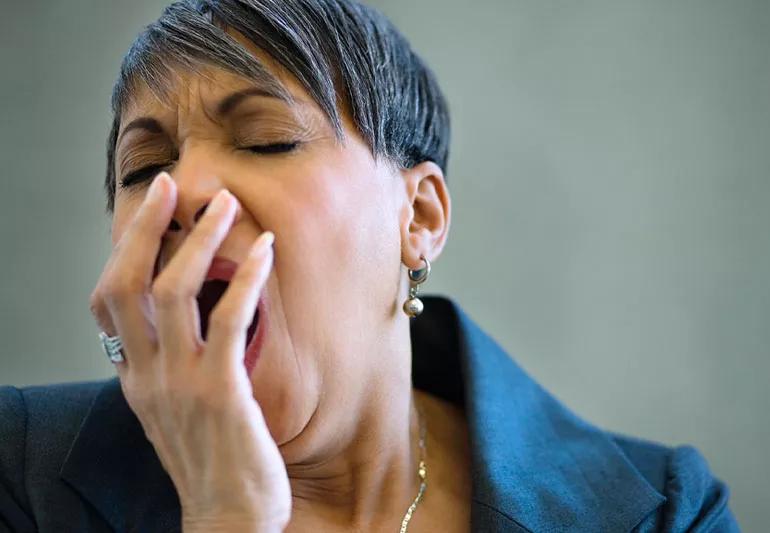Fatigue is more likely caused by low blood pressure or another condition

Image content: This image is available to view online.
View image online (https://assets.clevelandclinic.org/transform/b3087c4b-9edc-43ee-8d56-cf99b2f402d6/person-Yawning-82796100-770x533-1_jpg)
Closeup of older business person yawning into hand.
High blood pressure, or hypertension, gets blamed for all kinds of unpleasant symptoms, like dizziness and headaches. In reality, though, it’s not usually the culprit behind many symptoms at all, lending it the nickname “the silent killer” — a critical health concern that shows no warning signs.
Advertisement
Cleveland Clinic is a non-profit academic medical center. Advertising on our site helps support our mission. We do not endorse non-Cleveland Clinic products or services. Policy
What about tiredness, though? Surely high blood pressure could make you feel exhausted and run down all the time, right? It’s possible, says preventive cardiologist Luke Laffin, MD, but it’s actually not all that likely.
“Everyone’s a little bit different, so I would never discount someone’s symptoms by saying they’re not due to high blood pressure,” he says, “but it’s pretty difficult to find any major link between feeling fatigued and having elevated blood pressure.”
Let’s delve deeper into the connection (or lack thereof) between high blood pressure and feelings of fatigue.
If a home blood pressure monitor or drug store cuff machine tells you that your numbers are a little high, it can be all too easy to blame your symptoms on elevated blood pressure and call it a day.
But back up.
“Sometimes, when people see that their blood pressure numbers are a little abnormal, they tell themselves, ‘Ah, that must be what’s going on,’ but that’s not necessarily the case,” Dr. Laffin notes.
“It’s always warranted to have an in-depth discussion with your healthcare provider to figure out: Are these symptoms being driven by your blood pressure? Is it vice versa? Or are they completely unrelated?”
Advertisement
And if you haven’t had your blood pressure taken in a professional medical setting, it’s definitely worth doing so. Do-it-yourself blood pressure monitors don’t always tell the whole story — and sometimes, the numbers are skewed. But they’re still a good idea.
“They’re better than nothing, but the accuracy can be questionable,” Dr. Laffin says. “There’s actually a very standardized process that goes into measuring blood pressure, and it’s very important in making sure that you’re getting an accurate blood pressure reading.”
Although hypertension doesn’t typically cause fatigue and exhaustion, those feelings can actually be symptoms of low blood pressure, known as hypotension.
“There’s no question about that, and the data is much stronger,” Dr. Laffin confirms.
Sometimes, low blood pressure doesn’t cause any symptoms. But when the blood in your body isn’t circulating the way that it should be, your brain doesn’t get enough blood flow. This can make you feel fatigued, lethargic, sluggish, tired and weak — which are all similar ways of saying “run down and exhausted.”
Low blood pressure can cause other symptoms, too, for the same reasons. They include:
When you’re feeling exhausted and run down, your first thought probably turns toward sleep — both quantity and quality. But what if you’re feeling fatigued with no obvious cause?
Feelings like fatigue and tiredness are multifactorial, says Dr. Laffin, which means a lot of factors can play a role in them. They can be the result of a variety of medical conditions, including:
And then, of course, there are lifestyle habits. Dehydration can contribute to exhaustion, as can what you eat and how often you exercise. Fatigue can be a side effect of some medications, too.
“Many of these factors can also be risk factors for hypertension,” Dr. Laffin says, “so it’s important to try to separate these issues and tease them out to get to the bottom of what’s causing your symptoms.”
Advertisement
In other words, high blood pressure may not be causing your fatigue — but your fatigue could be caused by something else that’s also contributing to your high blood pressure. Either way, it’s important to get to the bottom of it with the help of a healthcare provider.
“You still have to treat your blood pressure,” Dr. Laffin says, “but we need to look into these other factors, as well.”
Your blood pressure is an important signifier of your overall health. If it’s too high or too low, it could be a sign that something is off with your health, and it increases your risk of other serious issues, like:
“Chronically elevated blood pressure is a serious medical condition,” Dr. Laffin states, “but the vast majority of people with hypertension don’t have any symptoms whatsoever.”
There are natural ways to lower your blood pressure, and if you can’t seem to get those numbers to budge, medications are an option. But high blood pressure is often slow and cumulative, meaning it creeps higher and higher with time. See your doctor regularly and try to live a healthy lifestyle to help keep that increase at bay.
To hear more from Dr. Laffin on this topic, listen to the Health Essentials Podcast episode, “Combating High Blood Pressure.” New episodes of the Health Essentials Podcast publish every Wednesday.
Advertisement

Sign up for our Health Essentials emails for expert guidance on nutrition, fitness, sleep, skin care and more.
Learn more about our editorial process.
Advertisement
While not magic elixirs, some drinks like beet juice and skim milk may help keep numbers down
And if yours has been a little higher, learn how to get it under control
Advice for resistant hypertension
Too much vitamin D can create heart health hazards
How specialists tackle stubborn hypertension
Study finds more people have chronic hypertension, even before they’re pregnant
Maintaining normal blood pressure should be your goal
Tips for taking and tracking accurate blood pressure measurements
Type 2 diabetes isn’t inevitable with these dietary changes
Applying a hot or cold compress can help with pain
Pump up your iron intake with foods like tuna, tofu and turkey